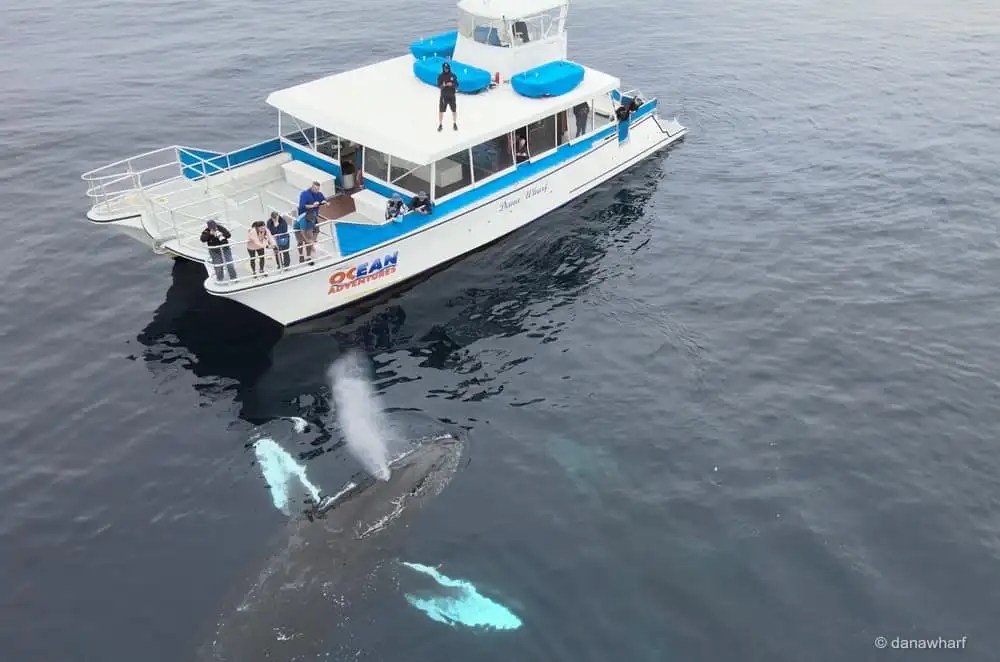Unveiling the Truth: Are Humpback Whales Dangerous?

Humpback whales are one of the most majestic creatures in the ocean. With their massive size and graceful movements, they have captured the hearts of many. However, there is still a lingering question in the minds of some: are humpback whales dangerous? In this article, we will delve into the facts and myths surrounding these gentle giants and uncover the truth about their behavior.
The Facts About Humpback Whales
Before we can determine if humpback whales are dangerous, it is important to understand some basic facts about them. Here are some key points to keep in mind:
Size and Appearance
Humpback whales are one of the largest species of whales, reaching lengths of up to 52 feet and weighing up to 40 tons. They have a distinctive appearance, with long pectoral fins and a knobby head. Their bodies are mostly black with white markings on their undersides, making them easily recognizable.
Diet and Feeding Habits
Humpback whales are filter feeders, meaning they consume large amounts of small prey such as krill, plankton, and small fish. They use a technique called “bubble net feeding” where they blow bubbles to create a net of bubbles around their prey, making it easier to catch them in their mouths.
Migratory Patterns
Humpback whales are known for their long-distance migrations, traveling up to 16,000 miles each year. They migrate from their feeding grounds in colder waters to warmer waters for breeding and calving.
Social Behavior
Humpback whales are highly social creatures and are often seen in groups called “pods”. They communicate with each other through a variety of vocalizations, including songs that can last up to 20 minutes.
Debunking the Myths
Now that we have a better understanding of humpback whales, let’s address some common myths and misconceptions about their behavior.
Myth #1: Humpback Whales Are Aggressive Towards Humans
One of the biggest misconceptions about humpback whales is that they are aggressive towards humans. This is simply not true. Humpback whales are known for their gentle nature and have never been known to attack humans unprovoked. In fact, there are many documented cases of humpback whales actively avoiding human contact.
Myth #2: Humpback Whales Are Known to Capsize Boats
Another common myth is that humpback whales are capable of capsizing boats. While it is true that humpback whales are large and powerful creatures, they are not known to intentionally harm boats or humans. In fact, they are often curious and may approach boats out of curiosity, but they do not pose a threat to the vessel.
Myth #3: Humpback Whales Are Known to Attack Other Marine Life
Some people believe that humpback whales are aggressive towards other marine life, such as seals or dolphins. While humpback whales do occasionally hunt for food, they are not known to attack other animals for any other reason. In fact, they have been observed protecting other species from predators, showing their gentle and nurturing nature.
The Truth About Humpback Whales
Now that we have debunked some common myths, let’s take a closer look at the truth about humpback whales and their behavior.
Humpback Whales Are Gentle Giants
Humpback whales are often referred to as “gentle giants” due to their peaceful and non-aggressive nature. They are known for their curiosity and may approach boats or humans out of interest, but they do not pose a threat.
They Are Highly Intelligent
Humpback whales have one of the largest brains of any animal, and they are known for their intelligence. They have complex social structures and are capable of learning and adapting to their environment.
They Are Important to the Ecosystem
Humpback whales play a crucial role in the ocean’s ecosystem. As filter feeders, they help maintain a balance in the food chain by consuming large amounts of small prey. They also contribute to the ocean’s nutrient cycle through their waste, which helps support the growth of phytoplankton.
They Are Protected by Law
In 1966, humpback whales were listed as an endangered species due to commercial whaling. Since then, they have been protected by law, and their population has slowly recovered. Today, humpback whales are classified as a species of “least concern” by the International Union for Conservation of Nature (IUCN).
The Importance of Responsible Whale Watching
One of the best ways to experience humpback whales is through whale watching tours. These tours allow you to see these magnificent creatures up close and personal while also learning about their behavior and conservation efforts. However, it is important to choose a responsible whale watching company, such as Dana Wharf Whale Watching, to ensure the safety and well-being of the whales.
Responsible whale watching companies follow strict guidelines to minimize their impact on the whales and their environment. They also provide educational information about humpback whales and their conservation efforts, helping to raise awareness and support for these amazing creatures.
So, are humpback whales dangerous? The answer is no. Humpback whales are gentle, intelligent, and important creatures that play a crucial role in the ocean’s ecosystem. While they may approach boats out of curiosity, they do not pose a threat to humans or other marine life. By choosing a responsible whale watching company, you can have a safe and unforgettable experience with these majestic creatures.
